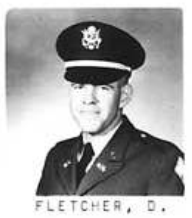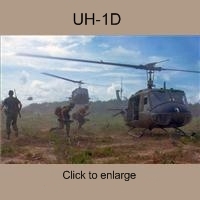 In
Vietnam there was a common phrase that had to do with the job
you performed, and how long you could expect to live because of
that job. When two people met each other it was common for one
to ask the other "what's your MOS" (Military Occupational
Specialty)? Depending on your answer, you would hear the
response "then your life expectancy is about 3 months..." or
whatever was appropriate for your MOS. Little more than idle
talk, pegging someone's life expectancy was an exercise in
morbid humor that kept all of us smiling and able to deal with
the reality of death at any moment.
In
Vietnam there was a common phrase that had to do with the job
you performed, and how long you could expect to live because of
that job. When two people met each other it was common for one
to ask the other "what's your MOS" (Military Occupational
Specialty)? Depending on your answer, you would hear the
response "then your life expectancy is about 3 months..." or
whatever was appropriate for your MOS. Little more than idle
talk, pegging someone's life expectancy was an exercise in
morbid humor that kept all of us smiling and able to deal with
the reality of death at any moment.
Signal Officers didn't have an especially short life expectancy,
unless they had special training and were working in that
capacity. For those without special duty training, the average
Signal Officer's life expectancy was up around 11 months, which
meant that if you kept your nose clean, did your job well, and
kept your head down you would probably rotate back to the States
with no problem. Most people did.
For those Signal Officers that went through Ranger training, or
jump school, joined the Green Beanies (Green Beret), sat on a
remote signal site fending off weekly sapper charges, or became
chopper pilots or the like, life expectancy was dramatically
lower.
Life expectancy for chopper pilots was right down there with
that of an infantry ground pounder. The facts are cold and
stark:
-
Approximately 12,000 US Helicopters flew
in the Vietnam War. Approximately 5,000 were destroyed. That
means 42% of the aircraft that spent time in the air crashed
or were shot down...nearly 3 out of every 7 that flew.
-
Approximately 40,000 US Helicopter
Pilots flew in the Vietnam War. Approximately 2,202 pilots
were killed, along with 2,704 crewmen. For those with their
hands on the joystick that means 5.5% never made it back.
Considering that the average pilot flew 4 times a week, he
could expect that during his tour in Vietnam he was flying
up against the Grim Reaper on 11.4 of his flights. That
means that every 4.5 weeks he faced death. In soldier talk,
his life expectancy was 4 and a half weeks... basically, a
month.
What's often forgotten in this is that helicopters weren't built
to fly around empty. They carried cargo... usually human cargo.
Soldiers. One of the best was the UH-1D.
The Bell (model 205) UH-1D (1963) had a longer fuselage than
previous models, increased rotor diameter, increased range, and
a more powerful Lycoming T53-L-11, sporting 1,100 shp, with
growth potential to 1,400 shp. A distinguishing characteristic
of this ship was its larger cargo doors, as well as its twin
cabin windows. The UH-1D was stretched so that it could carry up
to 12 troops, with a crew of two. The first UH-1D reached
Vietnam in 1963. With a range of 293 miles (467km) and a speed
of 127 mph (110 knots), it was a formidable troop carrier. With
so many people on board, it was also a formidable death trap
when it went down.
Lieutenant Fletcher went down on a UH-1D. Lieutenant Fletcher
was a friend of mine.
At the time I knew him he was stationed in Nha Trang, living in
the BOQ (Bachelor Officer Quarters) village that most of us
Signal Officers were billeted in. He was one of the first people
I met after coming down to Nha Trang from a tour that included 7
months on a 7,800 foot high signal site outside of Dalat. My
best friend at the time, Roger Elsasser (07-67), introduced me
to him. For some reason Don Fletcher took Roger under his wing
and treated him like a younger brother. That's the kind of guy
Don was. If he liked you, he made you "family."
What I remember most about him was that to me, after 7 months in
the Boonies, for a young Officer, Don was larger than life. From
the first time I met him I was struck by his imposing persona. "Strack"
(straight and squared away), handsome, with a square jaw and
compelling smile, he exuded leadership, confidence and trust. He
seemed to live with a vibrancy
and joie de vivre that few others had. The BOQ he lived in had a big sign on the
door that said "Go Away. This Is Not The Red Cross." The message was
clear: Stand on your own two feet. Solve your own problems. Get on
with life.
 Don was assigned to the 54th Signal Battalion, 1st Signal
Brigade. One of his duties was to fly around distributing pay to
those stationed at remote signal sites and the like. In one
respect, you can think of him as little more than "chopper
cargo." When it came to flying, most of us Signal Officers were. In another
respect,
since he spent so much of his time in choppers, you can think of
him has having a life expectancy not much greater than that of a
chopper pilot, albeit with less control over the outcome than
the guy with his hands on the joystick. When it comes to a face
off with death at 5,000 feet, those in the back of the bus are
at a distinct disadvantage.
Don was assigned to the 54th Signal Battalion, 1st Signal
Brigade. One of his duties was to fly around distributing pay to
those stationed at remote signal sites and the like. In one
respect, you can think of him as little more than "chopper
cargo." When it came to flying, most of us Signal Officers were. In another
respect,
since he spent so much of his time in choppers, you can think of
him has having a life expectancy not much greater than that of a
chopper pilot, albeit with less control over the outcome than
the guy with his hands on the joystick. When it comes to a face
off with death at 5,000 feet, those in the back of the bus are
at a distinct disadvantage.
I remember the night before Don took off to make one of his
payroll runs. I also remember the early afternoon of the next
day. That's when Roger told me that Don's chopper went down that
morning on a hill on the other side of the river that skirted
Nha Trang. The report was that a ROK (Republic of Korea) combat
team stationed on top of one of the hills had seen it going
down, but that no one was able to locate its final resting
place.
I, along with a few other friends, volunteered to form up a
search and rescue party to locate the site and hike to it, but
we were politely told that while our intentions were good, there
were far more qualified people in the Army to find and rescue
helicopter survivors than a bunch of Signal Officers.
As time passed, reports came back that all on board had been
killed.
Just like that, a guy with a low risk job turned out to have one
with a life expectancy much shorter than any of us guessed. It
turns out that being a payroll officer in Vietnam was nearly as
dangerous as that of a chopper pilot: life expectancy - about 8
months. Don beat it by a month.

In trying to complete this website we think it valuable to pull
together as many facts as possible about those who died in
Vietnam. When told of Lieutenant Fletcher's story, Major Green
(OCS Graduate Chief Locator, Secretary of the Army Signal Corps
OCS Association, Membership Coordinator, Historian, Director,
OCS graduate of Class 02-67, and former chopper pilot himself)
throttled-up his engine, pushed the cyclic forward, and pulled out all stops to find out how
my friend died. Among the people he contacted was Gary Roush,
President and Historian of the VHPA. Gary tracked down the
incident report for the helicopter that Don was on. Click below
to read it. It's sobering in its simplicity and clarity.

Thanks to Major Green and Gary Roush
from all of us who knew Don. Thanks for helping us
finally learn the facts surrounding the death of our friend.

